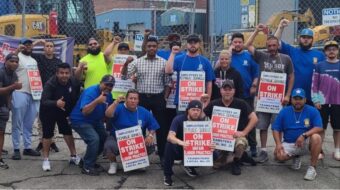Workers lost a unionization vote by 137 to 85 at a Target store on New York’s Long Island June 17. The United Food and Commercial Workers, however, which had hoped it would be the first of 1,700 stores nationally to go union, is continuing the fight.
“The workers at the Valley Stream store endured a campaign of threats, intimidation and illegal acts by Target management,” said Bruce Both, president of UFCW Local 1500. The union has asked the National Labor Relations Board to set up a new election and to order Target to cease it what it calls “its illegal activity.”
A complaint the union filed with the board three weeks prior to the election said Target had unlawfully prohibited workers from wearing pro-union buttons and from discussing working conditions even on online sites. The complaint also said Target had threatened workers with firing if they spoke openly about the union.
Workers at the Valley Stream Target say that at mandatory meetings supervisors told them that a union could not guarantee better pay or benefits and that the union only wanted their dues. They also report that managers told them that if they voted for the union, there was no guarantee that the store would remain open.
“Target did everything they could to deny these workers a chance at the American dream.” said Both.
The company denies that it violated any laws and says the union lost the election, essentially, because the company and its workers are a happy family.
Molly Snyder, a company spokesperson, told The New York Times: “We believe in solving issues and concerns by working together with the help and input of all team members.”
American Rights at Work has prepared extensive documentation regarding companies that fight union organizing efforts. The reports show that if Target did not harass workers who were pro-union, the company would actually be out of sync with most other employers.
An analysis of recent data on NLRB union election campaigns shows that 63 percent of employers interrogate workers in mandatory one-on-one meetings; 54 percent of employers threaten workers at those meetings; 57 percent make threats about closing the workplace; 47 percent threaten to cut wages and benefits and 34 percent actually fire union supporters.
Unions note that employers like Target carry out such illegal activities because the penalties for violating labor law are less costly than paying decent wages and benefits.
The website Gawker, known as a good place to go for celebrity gossip, has also done an excellent job of documenting and posting the concerns of Target workers:
A young man who worked at Target for five years, from when he was 16 until he was 21, said he was hired at $.50 over the minimum wage, although most at his store were hired at only $.25 over the minimum.
He described a policy of being subjected to forced overtime, even young workers who need time for school assignments: “The real kicker is that working all of these 10 to 12 hour shifts didn’t mean more money. As soon as you were in danger of receiving overtime pay, your remaining shifts for the week were cut. Those left working the shift were stuck doing the extra work. This alone is a good reason for a union.”
A young woman who is working her first job ever at Target: “I would like to go to college, but cant’ afford it. I think a union would make sense because at least then we have some hope of having a say. Currently, we honestly get shit hours, benefits are minimal and expensive, and reviews are a joke. We stay until all hours of the night, and we get acknowledged with just a great team card. If a union can make Target into a place with an awesome environment and at least passable pay and benefits, I am all for giving it a try.”










